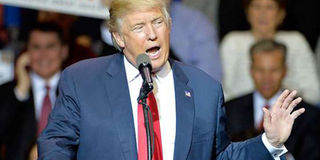In changed system, each vote would count

President-elect Donald Trump addresses an audience at Crown Coliseum on December 6, 2016 in Fayetteville, North Carolina. Less populated states that Trump said were forgotten voted overwhelmingly for the Republican candidate. PHOTO | AFP
What you need to know:
- We can base our system on the 47 counties, distributing the votes according to population.
- This system would ensure that presidential candidates do not rely only on their communities; they would have to go to many counties to seek votes.
California was one of the states that were hit by the unrest that followed the election of Donald Trump as the 45th president of the United States of America.
And it is understandable why many Californians would feel slighted by the win.
Being the most populous state and, therefore, allocated the highest number of Electoral College votes (55), most residents would certainly expect that this would influence the standing of the candidate the state backs.
As expected, in 2016 the state voted decisively for Hillary Clinton, the Democratic Party candidate, who lost to Trump after failing to garner enough support from key swing states to win the requisite 270 Electoral College votes.
Trump amassed votes from states considered small.
Less populated states that Trump said were forgotten voted overwhelmingly for the Republican candidate, thus contributing their small votes to enable him surpass the 270 limit required to be declared president-elect.
California’s massive numbers did not drown out the influence of the smaller states.
The objective of the US founding fathers to choose the Electoral College system to pick the president instead of the popular vote was achieved.
Is it possible to do the same in Kenya? I believe it is.
We can base our system on the 47 counties, distributing the votes according to population.
A REPLICA
If the results of the 2009 population census were to be used, Nairobi, which had the highest population of 3.1 million, would have the highest number of votes.
Kakamega was second with approximately 1.7 million people.
In third place were Bungoma, Nakuru, and Kiambu, which had just over 1.6 million people.
More than half of the counties had less than one million people, with some like Lamu having only 100,000 and Isiolo 160,000.
These would definitely have fewer votes.
However, even with less population, just like the Dakotas, their influence would be more consequential than when they participate in a popular vote system because their votes would matter in the election of the president.
Presidential candidates would not afford to ignore them.
Cosmopolitan counties such as Nakuru, Nairobi, Mombasa, and Trans Nzoia would be the swing states of Kenya.
They would likely experience heightened campaign activity.
The number of electoral college votes could be changed after every census (normally done after 10 years) to reflect the population changes.
Before you start celebrating, though, achieving this may not be easy.
First, the Constitution would have to be amended to establish this system.
This would mean a referendum. That plebiscite would probably be a battle pitting the large communities against the smaller ones.
SHIFTING FOCUS
Naturally, the populous counties would not want their influence watered down while the smaller ones would favour a system that puts power in their hands.
Another bone of contention would be the formula used to decide the number of electoral college votes for each county.
The US distributes the votes according to the number of each state’s representatives in the Congress (435 in the House and 100 in the Senate plus three from Washington DC, the US Capital), making a total of 538.
The number of members in the Congress is decided by each state’s population.
Kenya could borrow that idea and have 384 electoral votes (337 to correspond with the number of elected MPs in the National Assembly and 47 in the Senate) and the requirement of a simple majority of 193 electoral votes to be president.
The candidate who wins the popular vote should take all the county’s electoral votes.
This system would ensure that presidential candidates do not rely only on their communities; they would have to go to many counties to seek votes.
Mr Kiplang’at is the Nation Media Group’s Kisii regional editor. [email protected]





